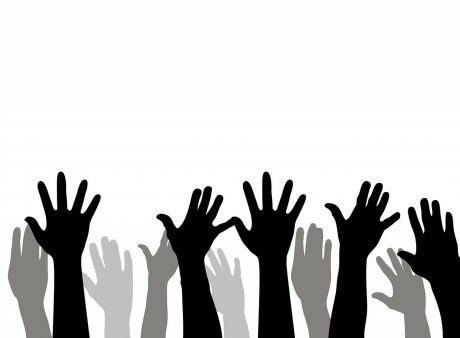Public Debates – Testing your Intellectual Abilities?
14 January 2019
Engaging in public debate can be a scary thing. You make yourself vulnerable to criticism when you express your views in public – risking a critique not only of the specific beliefs you endorse, but also of your intellectual abilities more broadly. How might you respond to such critiques? Are you open to the possibility that you might have made mistakes in your reasoning? Do you view that possibility as inherently threatening to your intellectual abilities, or do you view it as a potential opportunity to learn and sharpen your intellectual skills?
In a previous post, I focused on debates that had moral content to them, but I also think that any public debate has the potential for an explicit, or implicit, critique of one’s intelligence and intellectual skills (or epistemic virtues), and regardless of the specific content of the beliefs. This might also be threatening to one’s identity, not in the sense of one’s moral identity, but rather in one’s intellectual identity.
Other work done on views of intelligence and responses to critique is relevant here, specifically Carol Dweck’s work on intelligence. Dweck’s work on intelligence, amongst other abilities, shows that people fall broadly into two camps with respect to how they view abilities – it is either a fixed entity that you cannot do much to change, or it is malleable such that you can train to improve it.[1] These two mindsets, ‘fixed’ versus ‘growth’, have consequences for what goals we set ourselves – performance goals that demonstrate (to others or ourselves) we have the level of ability (e.g. intelligence) we take ourselves to have; versus learning goals where we strive to improve our ability and thus take on challenges. With fixed mindsets and performance goals, ultimately the goal is that one wants to be judged positively and avoid being judged negatively. In respect to public debates, that would presumably translate into being motivated to defend one’s initial position, rather than being open to changing one’s views, in order to avoid being seen as wrong (and thus perhaps indicating a lack of intelligence).
The two mindsets also have different consequences for how we react to failure. A fixed mindset leads to maladaptive responses because of feelings of helplessness to do better (e.g. frustration because one just isn’t smart enough); whereas a growth mindset leads to adaptive responses where a person puts forth effort to learn how to act better the next time (e.g. recognizing that they made a mistake, but also that they can put effort into improving and succeeding later).[2]
So what kind of mindset you have depends more on these two factors of goals and responses to failure, than on your stated beliefs. Mindset beliefs have been shown to be domain specific, so people could have different views of different abilities. But in the educational context, it looks like those who have a malleable view of their own intelligence achieve much better learning outcomes, because they seek goals challenging them to learn and because they have more adaptive responses to failure. Likely when it comes to defensiveness in public discourse, and whether people are truly open to learning from others, one factor that can affect this is one’s views about intelligence.
Notice that this distinction in mindsets ties in well with the two senses of shame discussed in my previous article. The two senses of self-shame had these same sorts of patterns with regard to adaptive and maladaptive responses to moral failure, in terms of motivating either self-improvement or defensiveness. The first sense of shame was so distressing because it seems to be something one cannot fix, leading to feelings of inferiority and defensiveness. For example, Dweck and Leggett found in their studies on children’s responses to intellectual challenges and failures, that:
helpless children viewed their difficulties as failures, as indicative of low ability, and as insurmountable. They appeared to view further effort as futile and, perhaps, as their defensive maneuvers suggest, as further documentation of their inadequate ability.[3]
This is strikingly similar to Gausel and Leach’s descriptions of reactions to felt inferiority, which involve maladaptive responses that are also characteristic of having a fixed rather than malleable mindset.[4] The second sense of shame, by contrast, was not experienced as so distressing, because although there is a failure, it is something one can work on improving.
Insofar as people can approach public debates as an opportunity to learn something new, this should help to prevent people from viewing a public debate as a referendum on whether one is intelligent or not (and thus a potential threat to their self-esteem). Otherwise, fixed mindsets regarding one’s intellectual abilities are likely to prompt defensive reactions that are linked to being resistant to change, as well as being biased in processing new information. In order to foster more effective public debates, these defensive reactions need to be curbed.[5] This is another area where self-affirmation techniques, which I discussed previously, such as writing about a value that is important to yourself, may also be of value.[6] People can be more open to accepting information that challenges their existing beliefs, and perhaps their intellectual abilities, after having another important aspect of their identity affirmed.
Image from Pixabay
[1] Dweck, Carol S. and Leggett, Ellen L. (1988) “A Social-Cognitive Approach to Motivation and Personality”, Psychological Review 95 (2), 256-273. Mindsets are also referred to as implicit theories, in which case the contrast is between ‘entity’ (i.e. fixed) and ‘incremental’ (i.e. malleable) theories.
[2] It should be noted that these mindsets are domain specific – people can have fixed mindsets about some abilities, and malleable mindsets about others.
[3] Dweck, Carol S. and Leggett, Ellen L. (1988) “A Social-Cognitive Approach to Motivation and Personality”, Psychological Review 95 (2), 256-273, 258.
[4] Gausel, L., & Leach, C. W. (2011). Concern for self-image and social image in the management of moral failure: Rethinking shame. European Journal of Social Psychology, 41(4), 468-478.
[5] Sherman, David K. and Cohen, Geoffrey L. (2002) “Accepting Threatening Information: Self-Affirmation and the Reduction of Defensive Biases”, Current Directions in Psychological Science 11 (4), 119-123.
[6] Sherman, D.K., & Cohen, G. L. (2006). The psychology of self-defense: Self-affirmation theory. Advances in Experimental Social Psychology, 38, 183-242.
- October 2025
- September 2025
- August 2025
- July 2025
- June 2025
- May 2025
- April 2025
- March 2025
- February 2025
- January 2025
- December 2024
- November 2024
- October 2024
- September 2024
- August 2024
- July 2024
- June 2024
- May 2024
- April 2024
- March 2024
- February 2024
- January 2024
- December 2023
- November 2023
- October 2023
- September 2023
- August 2023
- July 2023
- June 2023
- May 2023
- April 2023
- March 2023
- February 2023
- January 2023
- December 2022
- November 2022
- October 2022
- September 2022
- August 2022
- July 2022
- June 2022
- May 2022
- April 2022
- March 2022
- February 2022
- January 2022
- December 2021
- November 2021
- October 2021
- September 2021
- August 2021
- July 2021
- June 2021
- May 2021
- April 2021
- March 2021
- February 2021
- January 2021
- December 2020
- November 2020
- October 2020
- September 2020
- August 2020
- July 2020
- June 2020
- May 2020
- April 2020
- March 2020
- February 2020
- January 2020
- December 2019
- November 2019
- October 2019
- September 2019
- August 2019
- July 2019
- June 2019
- May 2019
- April 2019
- March 2019
- February 2019
- January 2019
- December 2018
- November 2018
- October 2018
- September 2018
- August 2018
- July 2018
- June 2018
- May 2018
- April 2018
- March 2018
- February 2018
- January 2018
- December 2017
- November 2017
- October 2017
- September 2017
- August 2017
- July 2017
- June 2017
- May 2017

